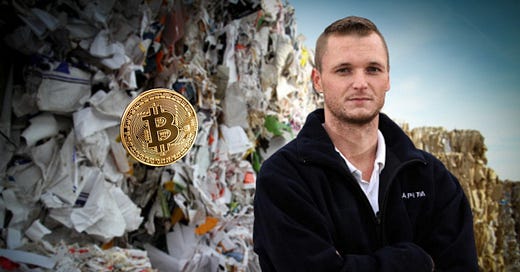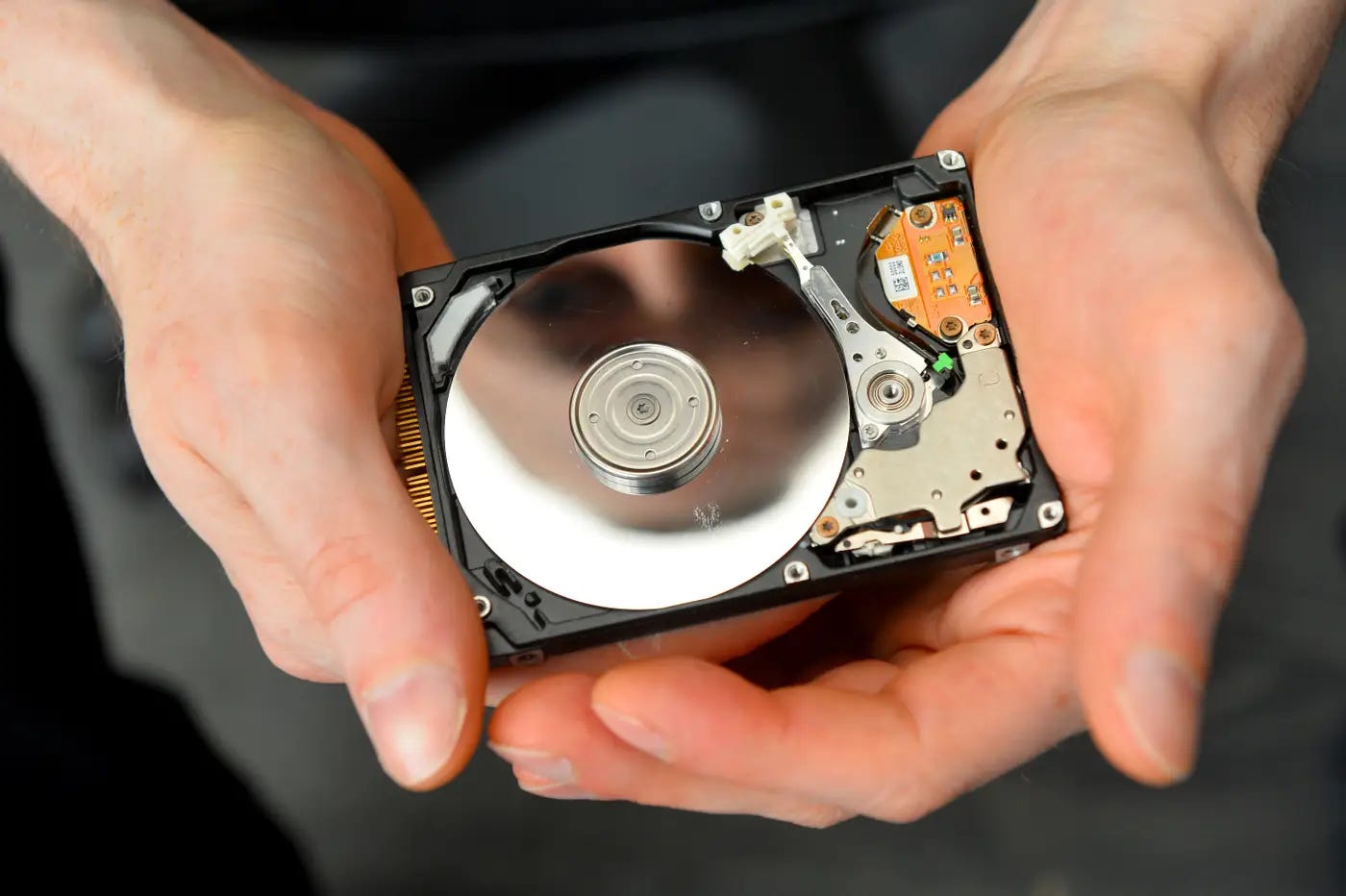I hate losing passwords. It’s really annoying. We’ve all done it. It doesn’t cost you millions of dollars, though. Usually not.
It may have cost James Howells, from Newport, Wales, a massive fortune. Howells mistakenly tossed a hard drive in the trash. One of two hard drives that he owned. One was blank. But the one he threw out contained the private keys to his Bitcoin wallet. That was in 2013.
Howells, 36, a former IT worker, had mined the coins back in 2009. Eight thousand Bitcoins, actually.
Now, with a bundle of funding from venture capitalists Hanspeter Jaberg and Karl Wendeborn, Howells has hatched a wild plan to retrieve his lost stash. Below are the details of the quest for the lost crypto wallet.
The Lost Stash, By the Numbers:
8,000. The number of Bitcoins in Howells’ Bitcoin wallet.
$190,000,000. Value today of the 8,000 Bitcoins.
110,000. Number of tons of garbage in the landfill.
$108,000 to $8.6 million. Value of the coins when lost in 2013.
$11,000,000. Venture capital committed to unearthing the hard drive.
3 The number of years this project is expected to take.
5.44 Length, in inches, of the lost hard drive.
(One needle, one very large haystack.)
The Process:
The landfill in Newport is already capped, filled over with dirt and grass. The ambitious $11 million plan, projected to take three years, will involve excavators, dump trucks, a sorting facility, and lots of high-tech equipment.
Plans are to use human sorters, as well as an AI machine called the Max-AI, built by a company in Oregon. The Max-AI would scan the garbage for items shaped like a hard drive and would be placed over a conveyor belt that transports the debris.
The Robotic Dogs:
Not kidding. Howells plans to acquire at least two robotic “dogs,” which are manufactured by Boston Dynamics. These four-legged devices retailed for about $75,000 each when they were released a few years back.
The robots serve two purposes: One, to provide security at night, functioning like roving closed-circuit cameras. Two, the dogs would sweep areas of the landfill during the day, looking for hard drive-shaped devices.
(Howells already has names for his pet robots. “Satoshi,” of course, and “Hal,” for the late Bitcoin pioneer Hal Finney.)
The Proceeds:
Howells has offered the City of Newport 25% of the proceeds from his effort. Call it a kickback or a bribe if you will, but rewards of nearly $50,000,000 would be hard for a municipality to turn down. He needs the city’s approval, however, to move forward.
He also plans to give about a third of the haul to his recovery team, another third to his investors, and still more to local charities. In addition, a small stipend would be paid to every resident of Newport.
If the hard drive is recovered intact, Howells should still have plenty of Bitcoin left over for himself.
Environmental Issues:
The City of Newport, after hearing Howells’ proposal via a Zoom meeting, has given him a preliminary answer to his request: No. Not going to happen. Howells, however, has petitioned the City Council, and has no plans to give up his quest.
The city cites the fact that the landfill is already capped, and that by digging it up, harmful greenhouse gases and methane could be released into the air.
Howells has offered these concessions:
The recovery team would cap and fill the landfill when complete, leaving it in the same condition as it is now.
During the sorting process, thousands of tone of recyclables would be retrieved and removed from the landfill.
When completed, Howells proposes to build a solar or wind farm on the top of the newly-capped landfill.
"There is nothing that Mr. Howells could present to us" that would make the council agree. "His proposals pose significant ecological risk, which we cannot accept and indeed are prevented from considering by the terms of our permit." - City Council rep.
Howells’ Last Resort:
If the City Council ultimately denies his request to dig up the landfill, Howells’ last opportunity may be to sue the town in court. Howells has been reluctant to get the courts involved, and in fact said he “wanted to work with the Newport City Council.” His last resort strategy may be to claim that the city’s actions constitute an “illegal embargo” on the hard drive.
The Moral:
The private keys to any crypto wallet need to be stored in more than one place. Today’s hardware wallets are excellent devices and also provide options for recovering lost keys. This information should be kept in “cold storage,” on devices that are not connected to the internet. Backups should be kept in safe places, fireproof boxes, bank safety deposit boxes, or something similar.
The Winklevoss twins stored their private keys in twelve bank safe deposit boxes, in four regions of the country. They were taking no chances.
More Lost Bitcoin:
How much Bitcoin has been lost or abandoned can never be accurately known, but one thing is for sure. Of the 21 million available Bitcoins, hundreds of thousands or even millions may be gone forever. It only makes Bitcoin more scarce. Good news for the rest of us.
(The New York Times estimates that 20% of the Bitcoin in existence today are held in “lost” wallets.)
Stefan Thomas - The San Francisco software developer acquired 7,002 Bitcoins, as early as 2011. His private keys were stored on an Iron Key USB stick. After losing his password, he had ten attempts to log in, but failed each time. When he lost his password, the stash was worth approximately $220 million.
(After eight attempts to crack the code, Thomas located professional “password guessers” to try to retrieve the password, to no avail.)
“Individual X: 69,000 Bitcoins - The seventh largest Bitcoin wallet in the world, today worth over $1.6 billion, was discovered on the dark web by hackers in 2018. It is believed that the US government knows the identity of the owner of the coins, but has not released the information publicly. The coins are thought to have been stolen from the Silk Road site, famously shut down by the Justice Department in 2013.
In order to trace the origin of the coins, the government hired the services of Chainalysis, a blockchain analysis company. No one has cracked open the wallet yet.
Satoshi Nakamoto - The pseudonymous creator of the Bitcoin code amassed a wallet containing 1.1 million Bitcoins. Today, that is worth around $26 billion. The coins have never moved.
Who Satoshi is, or whether they are even alive, is not known. Was Satoshi one person, or a group of coders, we may never know. What we know for sure is that this treasure trove has never been touched.
It’s a mystery for the ages.
Recommended Bitcoin Tools, Platforms, Podcasts:
Gemini - My choice for buying and HODLing Bitcoin, rated tops for safety and security. User-friendly platform and phone app. Earn Bitcoin rewards as well with the Gemini Credit Card.
Arculus - The crypto hardware wallet from Arculus is one of the best products on the market for storing your coins. Very easy to set up and to use, and very affordable.
Lolli - The Lolli shopping app lets you earn great Bitcoin rewards on practically everything you buy, whether you’re shopping on your phone, computer, or in-person.
Twitter - Follow The Bitcoin Files on Twitter at @BitcoinNewslet1 for all of my articles, commentary and links to my contributions to Bitcoin Magazine.
Medium - Check out my writings on Medium, including articles not featured in the newsletter. Join my 500 other followers who read and write about crypto. medium.com/@rickmulvey
Podcasts - To hear the top names in Bitcoin, and learn more than you could imagine, check out The Pomp Podcast with Anthony Pompliano, What Bitcoin Did with Peter McCormack, and The Wolf of All Streets Podcast with Scott Melker.
Issue No. 69, August 12, 2022
Rick Mulvey is a CPA, crypto consultant, and frequent contributor to Bitcoin Magazine. He writes about all things Bitcoin, and yells at the Yankees and Giants. He also runs marathons and makes wine, neither professionally.






